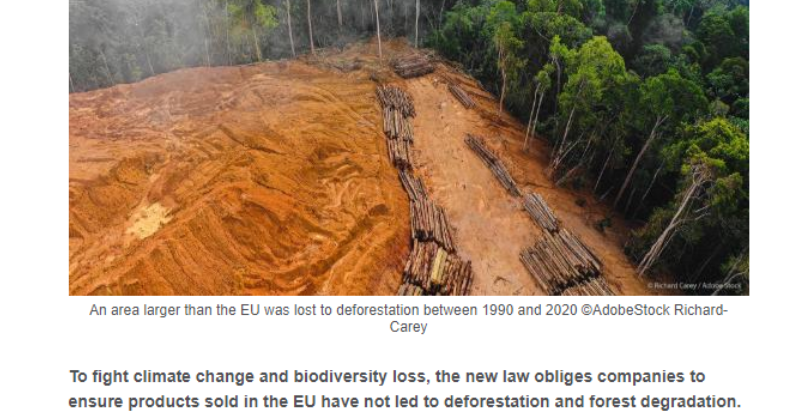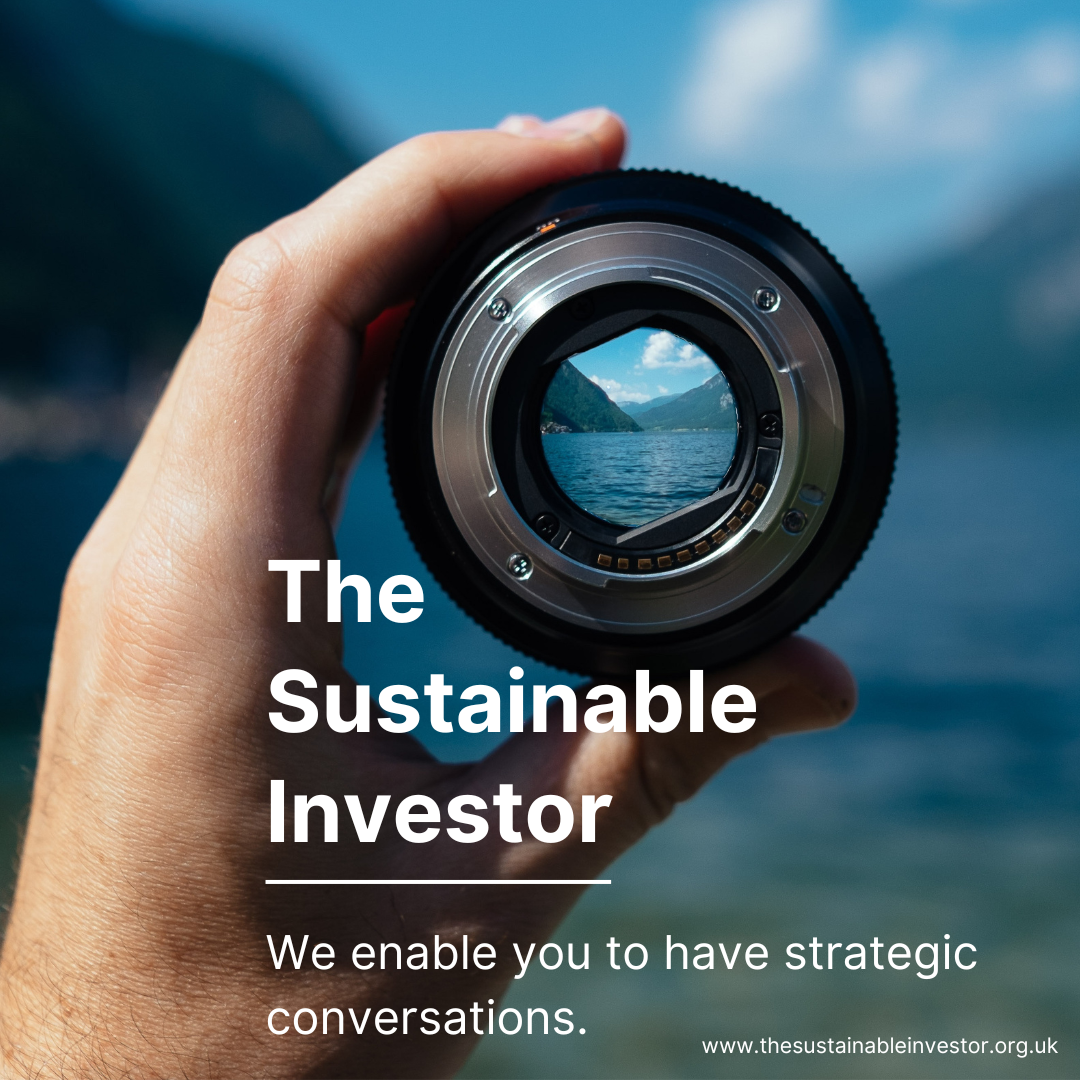
Supply chains come under even more scrutiny
As public opinion leads, legislation follows, at least in Europe. The most recent legislative move is on deforestation, but it's just one of a wave of new laws and regulations. And behind legislation comes litigation.
As public opinion leads, legislation follows, at least in Europe. The most recent legislative move is on deforestation, but it's just one of a wave of new laws and regulations. And behind legislation comes litigation. It's important that all investors (asset owners and asset managers) prepare for the upcoming changes. But we must also understand legislative developments holistically, rather than focusing on individual measures in isolation.
Summary: If we look forward 3-5 years, we can reasonably expect that supply chains will look different. And in some cases very different. Which will in turn impact sources of competitive advantage. This is driven at one level by a combination of end customer demands and new legislation, on environmental impact and human rights. But it's also likely to be impacted by litigation. We need to prepare now.
Why this is important: Normally investors track legal issues one by one. How will this new piece of legislation impact the companies I am analysing and over what time scale? But when change comes quickly, we also need to stand back and look at the totality of the impact. The financial markets are pretty good at looking forward. But sometimes we can miss the cumulative aspect. It can be materially greater than the sum of it's parts.

The details
Summary of a study published by the Gratham Institute
- 2,341 cases have been captured in the Sabin Center’s climate change litigation databases, with 1,590 in the US. 190 cases were filed worldwide in the last 12 months. The growth rate in cases appears to be slowing but the diversity in cases is still expanding. Looking back 2021 was a recent peak for cases filed. But we should not assume that less cases mean less impact. Cases that have been many years in the making have seen major developments: the European Court of Human Rights hearing in the KlimaSeniorinnen case, for example, took place seven years after the domestic case was originally filed.
- Future trends beginning to be observed include a shift toward biodiversity related cases, the importance of carbon sinks, plus a new focus on oceans, extreme weather events, and short lived climate pollutants. When taken together with existing trends, this suggests that in future we may see many more cases focused on how ‘climate solutions’ are being put into practice. The authors can also see the possibility of a rise in inter-state litigation.
Why this is important
Extensive and often complex supply chains lie at the heart of our current economic system. And for some companies these supply chains go beyond just being a part of their raw material sourcing process - they are an intrinsic element of their competitive advantage. Recent engagement from investors, combined with legislation action, has brought into focus the fact that many companies have limited knowledge of what happens upstream of their direct operations. This is especially problematic for some companies involved in the agricultural/food production sector, including those involved in beef, soy, cocoa and rubber. It's not just about the environment, human rights is equally important.
Increasingly, this lack of knowledge (and often the subsequent lack of action) is becoming unsustainable. There are three main pressures that are forcing change - social demands, new environmental and human rights legislation, and litigation. For today we will focus on new legislation in Europe, but in a later blog we want to start to pull this all together. Looking at this as a tick box compliance process, law by law, is just inviting future additional risk.
The good news is that most companies are (starting) to take the problem seriously, even if they lack data. Procurement and supply chain consultancy Proxima have revealed in a report that almost 70% of CEOs they surveyed worry about human rights abuses in their supply chains. The retail sector is even more concerned with almost 80% of CEOs highlighting it as a key concern.

New legislation is coming, especially in Europe
While the recent European Union’s Deforestation Regulation has got a lot of attention, it's only the latest in a wave of legal moves, including measures relating to human rights, and moves on biodiversity and our oceans.

Before highlighting some of the more important ones in a European context, a quick disclaimer. I am not a lawyer, my views on this topic come from three decades of dealing with companies and evaluating investment risk. Nothing in this blog should be interpreted as legal advice. OK, now we have got that out of the way.
The Corporate Sustainability Reporting Directive, the EU legislation that sets out environmental, social and governance reporting requirements for organisations, passed its final legal hurdle in December 2022. Starting in 2025, companies will have to start reporting under the "new" rules, with most companies covered by 2029. In practical terms, the regulation means that companies will have to report on how their business model affects their sustainability, and on how external sustainability factors (such as climate change or human right issues) influence their activities. This will equip investors and other stakeholders better for taking informed decisions on sustainability issues.

Looking specifically at supply chains, back in November 2021 we highlighted the passing of the German Supply Chain Due Diligence Act (Lieferkettensorgfaltspflichtengesetz). This law, which came into force on January 1st, 2023, makes companies more responsible for what happens in their supply chains.
In practice this means companies should be working to address issues around:
- labour standards in supply chains (including how these are enforced and controlled)
- fair recruitment practices
- effects of their operations on societies (including land and property issues; access to clean water; access to education)
- influences on participation (including avoiding undue influence on democratic processes)
- how well they comply with the "do no harm" requirement (a holistic evaluation of the impact of their investments and practices); and
- introduce results-based reporting (including transparency in challenges met and how they were dealt with).
This is not a two-minute job, remembering that increasingly companies who do not comply risk facing penalties.

But it's not just Germany (a point we made when we first published on supply chain law). This new law can be seen as the latest step in a fairly long process.
Back in 2015, the UK passed the Modern Slavery Act, which includes “Transparency in Supply Chain Provisions”, requiring companies with a turnover higher than £36 million to publish statements on the actions they take to avoid human trafficking and slavery happening in their business and supply chains. France passed a Vigilance Law (“Loi de Vigilance”) in 2017, which mandates French companies with more than 5,000 employees in France, or 10,000 worldwide, to adopt plans to address risks around human rights, occupational health and safety, and environmental damage in their supply chains. And, in 2019 the Netherlands adopted their Child Labour Due Diligence Law which will require Dutch companies to inspect their supply chains for child labour. If they find any instances, they are required to prevent it.
And the momentum is continuing, with the European Union moving to ban the import of products made with forced labour.

Litigation is changing
We cannot leave this topic without highlighting how litigation is changing. Many investors and companies look at environmental, human rights, and biodiversity legal risk as coming from actions by governments, and their various regulatory arms. This can include the various environmental agencies, financial regulators and via "reporting" requirements such as the EU taxonomy.
While these are important, their weakness as a mechanism for driving change is that they rely on the various parts of government for their enforcement, which can be slow & cumbersome. But, there is increasingly another mechanism - private citizens and lobby groups using litigation to force change. This can happen more rapidly, and its increasingly having a real world impact.

Adding to this, recent court decisions, especially in the UK, have opened the way for parent companies to be held accountable for the acts of their subsidiaries as well as for acts they commit on foreign soil when the justice system in the affected country is deemed to be too lengthy or not effective.

Their responsibility stems from the significant control they exercise over the subsidiary and its operations, towards which they are thus obliged to exercise a duty of care. The rulings represent a turning point which could also affect other common law countries such as Canada, Australia, and New Zealand, where it could constitute a precedent to grant access to an effective remedy to the impoverished communities whose rights have been violated by multinational corporations.
As we argued in our Human Rights deep dive, human rights is not just a values and ethics issue. It's also an investing issue, one that can have a very direct impact on a company's long term value creation. Companies that do not prepare will lose competitive positioning; it's not just about paying fines anymore.

Something a little more bespoke?
Get in touch if there is a particular topic you would like us to write on. Just for you.
Contact us
Please read: important legal stuff.



